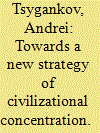| Srl | Item |
| 1 |
ID:
188295


|
|
|
|
|
| Summary/Abstract |
The essay analyses Russia’s historical goals in Eurasia and argues that the geopolitical meaning of Russia’s annexation of Crimea is closely related to the Kremlin’s ambition to play a key role in structuring the region. Russia’s determination to remain a major power, along with the global power transition from the West-centred to an increasingly regionalised world, make Russia’s return to Eurasia important. The return to Eurasia has demonstrated its promise to facilitate increased commercial relations within the Eurasian Economic Union (EAEU) as well as with China and other Asian countries. The future of Eurasia and Russia’s role in the region remain uncertain, however, because major participants are yet to align their visions of Eurasia, while Russia itself has yet to consolidate its internal economic and state capabilities.
|
|
|
|
|
|
|
|
|
|
|
|
|
|
|
|
| 2 |
ID:
153483


|
|
|
|
|
| Summary/Abstract |
Russian foreign policy successes in the Middle East have created new and more favorable conditions for Russia. These accomplishments include the proactive assertion of independence in the realm of mass media and humanitarian values, development of relations with China and a number of non-Western countries, and stimulatioin of profound changes in the world. The continuing disintegration of the liberal world order and the turn of the West towards national interests and conservative values, which began with Brexit and Donald Trumps victory in the U.S. presidential election, have made it possible for Russia to search for new partners with ideals closer to its own. In this context calls have been more frequent for pushing ahead with a vigorous foreign policy and formalizing a new world order approximating the Congress of Vienna model. In these circumstances, it is important to reconsider the goals and capabilities of Russia as a country with its own, special system of values that takes a unique geopolitical position.
|
|
|
|
|
|
|
|
|
|
|
|
|
|
|
|